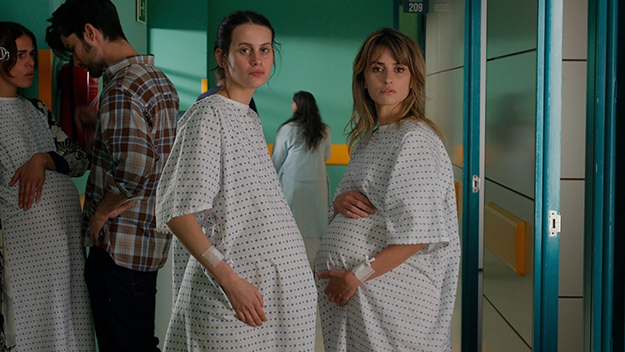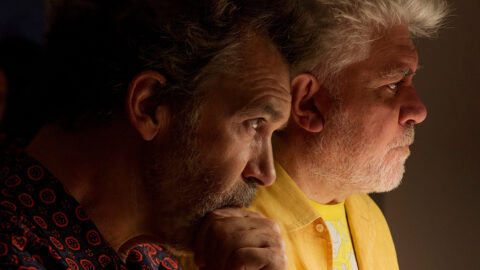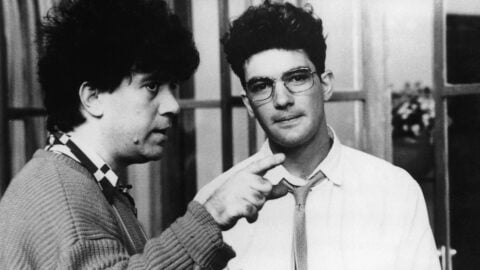Secrets and Lies
This article, part of our coverage of NYFF59, appeared in the October 15 edition of The Film Comment Letter, our free weekly newsletter featuring original film criticism and writing. Sign up for the Letter here.

Parallel Mothers (Pedro Almodóvar, 2021)
Enthusiasts and scholars of Pedro Almodóvar’s work have learned to read his oeuvre as a flaming immersion in the troubled waters of desire, a theme that recurs even in the titles of his films and the name of his production company, El Deseo. This inclination to highlight the filmmaker’s eye for existential entanglements and rapturous passions has overshadowed the other pillar of Almodóvar’s universe: the search for truth, understood as the fuel for the most extraordinary personal journeys, but also as a matter of social and historical justice. The latter operates as the driving force of Parallel Mothers, the new feature from the filmmaker of La Mancha, and probably his most openly political film to date.
Parallel Mothers tells the story of two single mothers—the teenaged Ana, played by newcomer Milena Smit, and the middle-aged Janis, played by Almodóvar’s muse, Penélope Cruz—as they navigate the dramatic obstacles that arise from a coincidence: both of their babies are born on the same day, and both children suffer an illness, “extrauterine inadaptation” and “cerebral immaturity.” Arriving in what might be considered the most restrained and least flamboyant period of Almodóvar’s career—nothing here feels gratuitous—Parallel Mothers unfolds as both a literal and symbolic response to the infants’ diseases; even more so because the film channels, through the healing processes of its (numerous) mothers, that of a whole country tending to the still-open wounds of its Civil War.
These twin ailments—cerebral immaturity and extrauterine inadaptation—take on metaphorical dimensions here, with Almodóvar resisting and overcoming them through his very filmmaking. Parallel Mothers conveys the maturity of a filmmaker who doesn’t need to resort to mannerisms to eloquently portray the intergenerational reconciliations which, in his view, are the only sediments out of which a decent future can grow. Made with a relative stylistic austerity that the Spanish auteur mastered in his previous film, Pain and Glory, Parallel Mothers unfolds directly and chronologically, occasionally bypassing the characters’ miseries and triumphs through wondrous ellipses, such as when the film cuts straight from a curtain dancing to the wind, hiding a sexual encounter, to the delivery room which will host the birth of the child conceived in the preceding shot.
The film also evokes a deep sense of adaptation to the world, a willingness to see through the eyes of others—let’s call it empathy—disseminated throughout a movie in which there is not a single evil character. Facing a contemporary reality ruled by machismo, antagonism, and cruelty, Almodóvar seeks refuge in the feminine universe—his own private paradise—and celebrates its diversity. The teenager, Ana, embodies both the discomfort and tenacity of a youth battered by new and old challenges, from sexual violence to precarious employment and the confusion of growing up in a country afflicted with historical amnesia. Janis emerges as the incarnation of devotional motherhood—a role that Cruz has already essayed in Volver and Pain and Glory. In Parallel Mothers, this archetype is symbolically reshaped by the mingling of the personal and public spheres, as Janis is not only resolved to secure her daughter’s future but also to locate the bodily remains of her great-grandfather, a victim of the White Terror of Francisco Franco. (According to a 2008 investigation, 114,226 individuals were “disappeared” and buried in mass graves during this period.) Finally, Almodóvar gives voice—through the character of Teresa (Aitana Sánchez Gijón), Ana’s mother—to the women who’ve had to struggle with their lack of maternal instinct. Teresa is an actress devoted to her artistic vocation, and Sánchez Gijón steals the show with an on-stage monologue from Doña Rosita the Spinster by Federico García Lorca, perhaps the most famous of the missing victims of the fascist Franco regime.
Despite the conciliatory spirit that prevails in Parallel Mothers—a film in which every character seems entitled to her own redemption—the non-conformism and demand for social progress that have always driven Almodóvar’s work are alive and well. Early in the film, a conversation between Janis and Arturo (Israel Elejalde), an anthropologist who works on excavations of mass graves, features a direct invective against the right-wing government of Mariano Rajoy, which blocked the passing of a Historical Memory Act. Almodóvar has expressed political views in his movies before: The Flower of My Secret (1995) used the student protests against the socialist government of Felipe González as the backdrop for the romantic and personal dramas of its writer-protagonist, while in Live Flesh (1997), the character of Víctor (Liberto Rabal) is doomed just by being born on the night of the last state of emergency of the Franco era in 1970. But Parallel Mothersshould be seen as a step forward in Almodóvar’s willingness to play a role in Spanish politics, where an ascendant far-right threatens hard-won gains.
Truth can be painful, but there’s no way to escape it. Parallel Mothers underlines this theme with a reference to Eugene O’Neill’s Long Day’s Journey Into Night, in which a mother futilely tries to hide her drug addiction from her family. Secrets and lies have always swirled around Almodóvar’s characters, while his country has grappled with historical erasure for too long. Now, in Parallel Mothers, Almodóvar crafts an ode to truths natural, emotional, and political, embodied in the unbreakable bonds between mothers and daughters, in the respect that courses through the film for the personal and sexual freedom of others, and in the obstinate memories of the descendants of the victims of a national tragedy.
Manu Yáñez Murillo is a Barcelona-based film critic and scholar who has been a contributor to Film Comment since 2006. He is the editor-in-chief of the website Otros Cines Europa and the editor of the anthology La mirada americana: 50 años de Film Comment.






